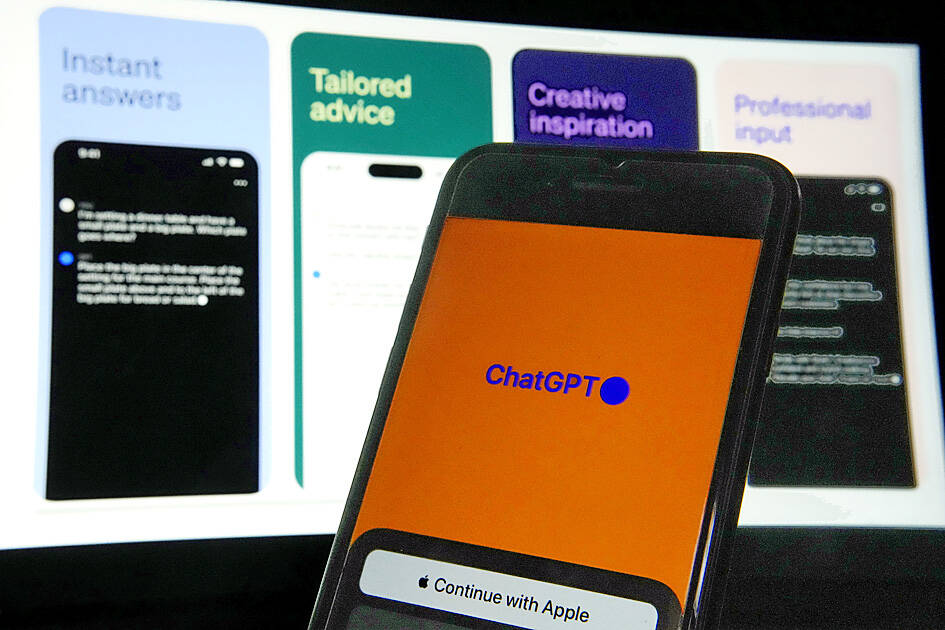Apple Inc has closed in on an agreement with OpenAI to use the start-up’s technology on the iPhone, part of a broader push to bring artificial intelligence (AI) features to its devices, people familiar with the matter said.
The two sides have been finalizing terms for a pact to use ChatGPT features in Apple’s iOS 18, the next iPhone operating system, said the people, who asked not to be identified because the situation is private.
Apple also has held talks with Alphabet Inc’s Google about licensing its Gemini chatbot. Those discussions have not led to an agreement, but are ongoing.

Photo: AP
An OpenAI accord would let Apple offer a popular chatbot as part of a flurry of new AI features that it plans to announce next month.
Still, there is no guarantee that an agreement would be announced imminently, the people said.
Representatives for Apple, OpenAI and Google declined to comment.
Apple plans to make a splash in the AI world next month, when it holds its annual Worldwide Developers Conference. As part of the push, the company would run some of its upcoming AI features via data centers equipped with its own in-house processors, Bloomberg has reported.
Last year, Apple chief executive officer Tim Cook said he personally uses OpenAI’s ChatGPT, but added that there were “a number of issues that need to be sorted.”
Cook promised that new AI features would come to Apple’s products on a “very thoughtful basis.”
On Apple’s earnings conference call early this month, Cook said that Apple would have an edge in AI.
“We believe in the transformative power and promise of AI, and we believe we have advantages that will differentiate us in this new era, including Apple’s unique combination of seamless hardware, software and services integration,” Cook said during the earnings call.
Separately, OpenAI is to announce product updates on livestream today, the company said in a post, stoking speculation about the AI giant’s next major release.
OpenAI said that it would not be launching a search product at the event.
Instead, the announcement would center around an update to ChatGPT and its GPT-4 AI model.
It has been more than a year since the company released GPT-4, its last flagship model, and a new version has been widely anticipated in the tech world.
However, the company said that it would not be launching GPT-5 — a sequel that is expected to be significantly more powerful.
In a post on X on Friday, OpenAI chief executive officer Sam Altman wrote: “not gpt-5, not a search engine, but we’ve been hard at work on some new stuff we think people will love! feels like magic to me.”

TAKING STOCK: A Taiwanese cookware firm in Vietnam urged customers to assess inventory or place orders early so shipments can reach the US while tariffs are paused Taiwanese businesses in Vietnam are exploring alternatives after the White House imposed a 46 percent import duty on Vietnamese goods, following US President Donald Trump’s announcement of “reciprocal” tariffs on the US’ trading partners. Lo Shih-liang (羅世良), chairman of Brico Industry Co (裕茂工業), a Taiwanese company that manufactures cast iron cookware and stove components in Vietnam, said that more than 40 percent of his business was tied to the US market, describing the constant US policy shifts as an emotional roller coaster. “I work during the day and stay up all night watching the news. I’ve been following US news until 3am

UNCERTAINTY: Innolux activated a stringent supply chain management mechanism, as it did during the COVID-19 pandemic, to ensure optimal inventory levels for customers Flat-panel display makers AUO Corp (友達) and Innolux Corp (群創) yesterday said that about 12 to 20 percent of their display business is at risk of potential US tariffs and that they would relocate production or shipment destinations to mitigate the levies’ effects. US tariffs would have a direct impact of US$200 million on AUO’s revenue, company chairman Paul Peng (彭雙浪) told reporters on the sidelines of the Touch Taiwan trade show in Taipei yesterday. That would make up about 12 percent of the company’s overall revenue. To cope with the tariff uncertainty, AUO plans to allocate its production to manufacturing facilities in

Six years ago, LVMH’s billionaire CEO Bernard Arnault and US President Donald Trump cut the blue ribbon on a factory in rural Texas that would make designer handbags for Louis Vuitton, one of the world’s best-known luxury brands. However, since the high-profile opening, the factory has faced a host of problems limiting production, 11 former Louis Vuitton employees said. The site has consistently ranked among the worst-performing for Louis Vuitton globally, “significantly” underperforming other facilities, said three former Louis Vuitton workers and a senior industry source, who cited internal rankings shared with staff. The plant’s problems — which have not

COLLABORATION: Given Taiwan’s key position in global supply chains, the US firm is discussing strategies with local partners and clients to deal with global uncertainties Advanced Micro Devices Inc (AMD) yesterday said it is meeting with local ecosystem partners, including Taiwan Semiconductor Manufacturing Co (TSMC, 台積電), to discuss strategies, including long-term manufacturing, to navigate uncertainties such as US tariffs, as Taiwan occupies an important position in global supply chains. AMD chief executive officer Lisa Su (蘇姿丰) told reporters that Taiwan is an important part of the chip designer’s ecosystem and she is discussing with partners and customers in Taiwan to forge strong collaborations on different areas during this critical period. AMD has just become the first artificial-intelligence (AI) server chip customer of TSMC to utilize its advanced